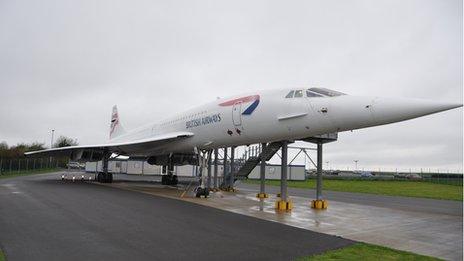Could Concorde ever fly again? No, says British Airways
- Published
Former Concorde pilot Martin Robson is reunited with the iconic plane
Ten years ago today, our ever-shrinking world got a little bit bigger again.
Three Concordes landed in a procession at Heathrow airport, while thousands of emotional fans looked on.
After 27 years, the world's most famous plane had been pensioned off - first by Air France and then by British Airways - marking the end of supersonic passenger flight.
So how is it that a noisy, polluting lump of aluminium, that was too pricey for most people to ride in, is still so popular?
"It was probably more advanced than Apollo 11, which put the first men on the Moon."
Jock Lowe is not only Concorde's longest-serving pilot, he's a former president of the Royal Aeronautical Society.
"No military plane came anywhere close. It was so manoeuvrable and there was so much spare power, even ex-fighter pilots weren't used to it."
Jock can't keep the joy out of his voice as he tells me what Concorde was like to fly.
"The time we took it to the Toronto International Airshow, 750,000 people turned out to watch. I'll never forget that sight."
Faster and higher
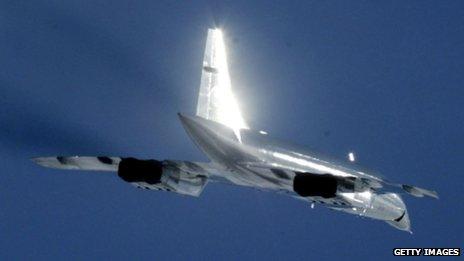
Concorde's drooping nose meant the aircraft was streamlined in flight and gave the pilot a clear view during take-off and landings
He is modest about it, but Jock is part of an elite club. There are more US astronauts than there are Concorde pilots.
Jock then recalled the time he was chatting to some pilots of the super-secret American spy plane, the SR71 Blackbird.
Now, the whole point of that amazing aircraft was that it flew way beyond the reach of other planes. Faster and higher, hidden away.
But one day, these guys said that their air traffic controller told them to get out of the way because there was a Concorde coming through. They couldn't believe it.
Peering out of one window, two American military pilots wearing spacesuits.
Peering out of the other, perhaps Joan Collins guzzling champagne - I'm guessing she was on the plane as she often was. I wonder if they waved?
Technically, Concorde was revolutionary.
It was the first aircraft to have computer-controlled engine air intakes. This may not sound much but it was one of the most significant leaps in aviation technology at the time.
In any technology, in fact.
It meant that they could slow the air down by 1,000mph in the space of about 15ft (4.5m). Without that, the engines would have blown apart.
Concorde had carbon-fibre brakes. Again, the norm now, but back in the 1960s a technological marvel - and it was fly-by-wire decades before Airbus made that a mainstream technology.
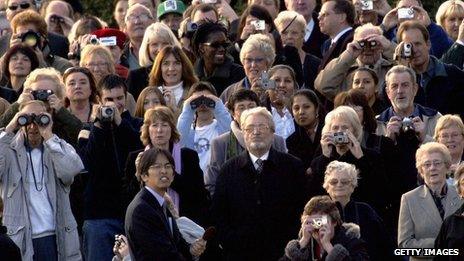
Fans watch the last British Airways Concorde flights land at Heathrow on 24 Oct 2003
'Return to the skies'
A decade on, there is still a lot of anger at the way Concorde was retired, with British Airways and Airbus, which was responsible for spares and maintenance, both often accused of pulling the plug too soon.
Almost as soon as the final flights touched down, a campaign was launched to get her airborne again. And it is still going strong.
The Save Concorde Group (SCG) wants British Airways to either help fund a heritage flight, or release an aircraft to someone else who will.
BA still owns eight Concordes, which remain scattered in museums across the globe, from Barbados to Manchester.
"The only real reason for Concorde's retirement was politics, and that remains the single obstacle in the way of her return to the skies," says Ben Lord from the SCG.
He told me that he is certain he can get a Concorde flying again for £20m ($32m) and he reckons Sir Richard Branson would still help him out with the money.
"I still have a wonderful desk model of the plane in full Virgin Atlantic livery," says Sir Richard in his latest blog, external.
"But despite offering £1m for each aircraft (they were originally sold to BA by the British government for £1) sadly our friends at British Airways were having none of it - and decommissioned the planes in a way that makes any chance of them flying again an unlikely prospect!"
Supersonic successors
Talking of money, let's scotch that myth that the great gas-guzzler did not make any cash for British Airways.
Going back to Jock Lowe, he told me that up until that horrendous crash at Paris in 2000, she made a net average profit of about £30m a year.
That is £500m net profit over her lifetime. And Jock insists that in her final few months before retirement, she was still making money.
Still, he does not think Concorde will ever get airborne again. And when I spoke to British Airways the answer was the same as it has always been.
No chance.
"We firmly believe that the technical and safety challenges of returning a Concorde to the skies are absolutely prohibitive," says BA.
So will we ever see her like again?
Well, the world's two dominant planemakers, Airbus and Boeing, certainly do not plan to build something supersonic any time soon.
But there other options on the horizon.
Sir Richard Branson's space plane Virgin Galactic is due to take its first paying passengers next year and he is promising that within his lifetime, they will be able to fly people from London to Sydney in two and a half hours with minimal impact on the environment.
Looping the loop
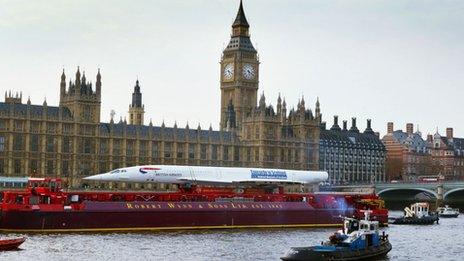
Sailing by - British Airways' last Concorde passes the Houses of Parliament on its way to a museum
One final thought. I asked Jock Lowe if they ever did aerobatics when they were testing Concorde.
He said they did execute barrel rolls, but never a loop-the-loop, although the aeroplane was more than capable of doing it.
Doubtless it would have spilled some champagne.
- Published24 October 2013
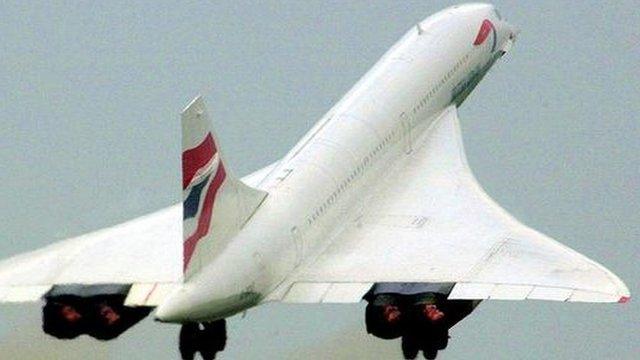
- Published28 May 2013
